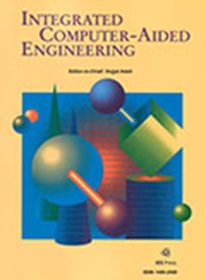在开放式学习机器人中使用感知类来梦想策略
IF 5.3
2区 计算机科学
Q1 COMPUTER SCIENCE, ARTIFICIAL INTELLIGENCE
引用次数: 0
摘要
实现终身开放式自主学习(LOLA)是机器人领域迈向智能响应新水平的关键挑战。机器人应该能够在特定领域发现目标并学习技能,从而实现设计师为它们设定的总体目标。此外,机器人应该在不同的领域重复使用以前学习过的知识,以促进新领域的学习和适应。为此,出现了包含不同组件来支持LOLA的认知架构。这些体系结构的一个关键特征是在考虑过程和反应过程之间实现适当的平衡,这允许有效的实时操作和知识获取,但这仍然是一个开放的问题。首先,目标必须以独立于领域的表示来定义,以允许自主地确定依赖于领域的目标。其次,由于没有明确的奖励函数,因此还必须开发一种确定预期效用的方法。最后,政策学习可能发生在内部审议尺度(做梦)中,因此有必要提供一种有效的方法来推断相关和可靠的数据,使做梦具有意义。前两个方面已经在e-MDB认知体系结构领域中得到了解决。对于第三个问题,本研究提出知觉类(p节点)作为一种元认知结构,它允许生成相关的“梦想”数据点,从而以一种非常有效的方式为审议性政策学习创建“想象”轨迹。所提出的结构已通过在LOLA环境中与真实机器人进行的实验进行了测试,该实验表明,在如此具有挑战性的领域中,政策梦想是如何实现的。本文章由计算机程序翻译,如有差异,请以英文原文为准。
Using perceptual classes to dream policies in open-ended learning robotics
Achieving Lifelong Open-ended Learning Autonomy (LOLA) is a key challenge in the field of robotics to advance to a new level of intelligent response. Robots should be capable of discovering goals and learn skills in specific domains that permit achieving the general objectives the designer establishes for them. In addition, robots should reuse previously learnt knowledge in different domains to facilitate learning and adaptation in new ones. To this end, cognitive architectures have arisen which encompass different components to support LOLA. A key feature of these architectures is to implement a proper balance between deliberative and reactive processes that allows for efficient real time operation and knowledge acquisition, but this is still an open issue. First, objectives must be defined in a domain-independent representation that allows for the autonomous determination of domain-dependent goals. Second, as no explicit reward function is available, a method to determine expected utility must also be developed. Finally, policy learning may happen in an internal deliberative scale (dreaming), so it is necessary to provide an efficient way to infer relevant and reliable data for dreaming to be meaningful. The first two aspects have already been addressed in the realm of the e-MDB cognitive architecture. For the third one, this work proposes Perceptual Classes (P-nodes) as a metacognitive structure that permits generating relevant “dreamt” data points that allow creating “imagined” trajectories for deliberative policy learning in a very efficient way. The proposed structure has been tested by means of an experiment with a real robot in LOLA settings, where it has been shown how policy dreaming is possible in such a challenging realm.
求助全文
通过发布文献求助,成功后即可免费获取论文全文。
去求助
来源期刊

Integrated Computer-Aided Engineering
工程技术-工程:综合
CiteScore
9.90
自引率
21.50%
发文量
21
审稿时长
>12 weeks
期刊介绍:
Integrated Computer-Aided Engineering (ICAE) was founded in 1993. "Based on the premise that interdisciplinary thinking and synergistic collaboration of disciplines can solve complex problems, open new frontiers, and lead to true innovations and breakthroughs, the cornerstone of industrial competitiveness and advancement of the society" as noted in the inaugural issue of the journal.
The focus of ICAE is the integration of leading edge and emerging computer and information technologies for innovative solution of engineering problems. The journal fosters interdisciplinary research and presents a unique forum for innovative computer-aided engineering. It also publishes novel industrial applications of CAE, thus helping to bring new computational paradigms from research labs and classrooms to reality. Areas covered by the journal include (but are not limited to) artificial intelligence, advanced signal processing, biologically inspired computing, cognitive modeling, concurrent engineering, database management, distributed computing, evolutionary computing, fuzzy logic, genetic algorithms, geometric modeling, intelligent and adaptive systems, internet-based technologies, knowledge discovery and engineering, machine learning, mechatronics, mobile computing, multimedia technologies, networking, neural network computing, object-oriented systems, optimization and search, parallel processing, robotics virtual reality, and visualization techniques.
 求助内容:
求助内容: 应助结果提醒方式:
应助结果提醒方式:


